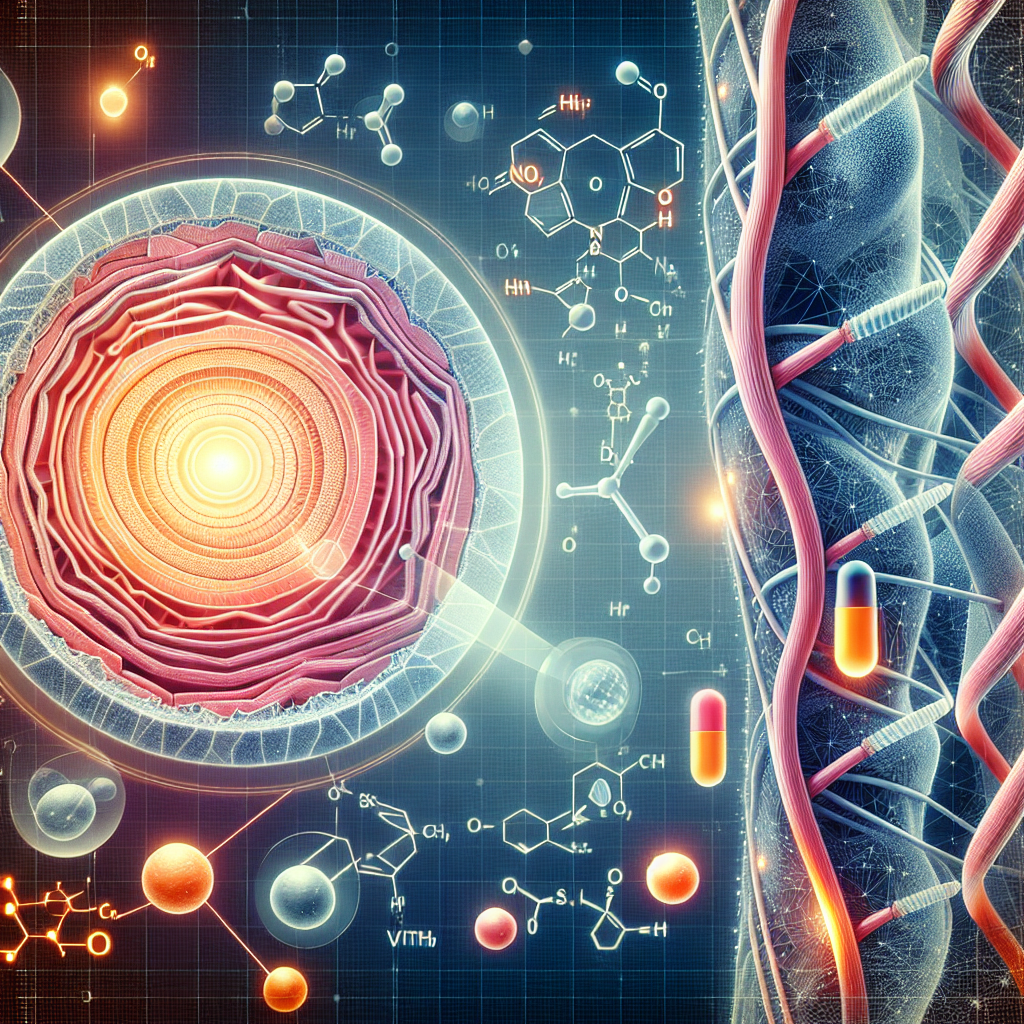The Science Behind Vitamins and Skin Elasticity

Discover the science behind vitamins and skin elasticity! Learn how the right vitamins can enhance your skin’s health and youthfulness. Visit My Vibrant Vitality now to start your journey towards vibrant, elastic skin.
The Role of Vitamins in Maintaining Skin Elasticity: A Scientific Perspective
The science behind vitamins and skin elasticity is a fascinating field of study that has garnered significant attention in recent years. As we age, our skin naturally loses its elasticity, leading to the formation of wrinkles and fine lines. However, research has shown that certain vitamins can play a crucial role in maintaining skin elasticity, thereby slowing down the aging process.
Vitamins are organic compounds that our bodies need in small amounts to function properly. They are essential for various bodily functions, including growth, digestion, and nerve function. Some vitamins also have antioxidant properties, meaning they can protect our cells from damage caused by free radicals, unstable molecules that can harm cellular structures. This protective function is particularly important when it comes to skin health.
One of the key vitamins in maintaining skin elasticity is vitamin C. This water-soluble vitamin is a potent antioxidant that aids in the synthesis of collagen, a protein that gives skin its elasticity. Collagen fibers form a network in the skin that provides structure and firmness. As we age, the production of collagen decreases, leading to sagging skin and wrinkles. However, by boosting collagen production, vitamin C can help to maintain skin elasticity and reduce the signs of aging.
Vitamin E is another essential nutrient that has been shown to have significant benefits for skin health. Like vitamin C, vitamin E is a powerful antioxidant that can protect the skin from damage caused by free radicals. In addition, vitamin E has been found to enhance skin moisture and elasticity, making it an important nutrient for maintaining youthful-looking skin.
Vitamin A, also known as retinol, is another key player in skin health. This fat-soluble vitamin is essential for cell growth and differentiation, two processes that are crucial for maintaining skin elasticity. Vitamin A can stimulate the production of collagen and elastin, two proteins that help to keep the skin firm and elastic. Moreover, vitamin A can promote the repair of skin damage, making it an important nutrient for healing and rejuvenating the skin.
Finally, vitamin D, often referred to as the “sunshine vitamin,” also plays a role in skin health. This vitamin is produced in the skin in response to sunlight, and it is essential for skin cell growth and repair. Vitamin D can also protect the skin from damage caused by free radicals, thereby helping to maintain skin elasticity.
In conclusion, vitamins play a crucial role in maintaining skin elasticity from a scientific perspective. Vitamins C, E, A, and D, in particular, have been shown to have significant benefits for skin health. These vitamins can boost collagen production, enhance skin moisture and elasticity, stimulate cell growth and differentiation, and protect the skin from damage caused by free radicals. Therefore, incorporating these vitamins into your diet or skincare routine can help to maintain skin elasticity and slow down the aging process. However, it’s important to remember that while vitamins can support skin health, they cannot replace a balanced diet, regular exercise, and a healthy lifestyle.
Understanding the Science: How Vitamins Contribute to Skin Elasticity

The science behind vitamins and skin elasticity is a fascinating field of study that has garnered significant attention in recent years. As we age, our skin naturally loses its elasticity, leading to the formation of wrinkles and fine lines. However, research has shown that certain vitamins can play a crucial role in maintaining and even improving skin elasticity, thereby slowing down the aging process.
Vitamins are organic compounds that our bodies need in small amounts to function properly. They are essential for various bodily functions, including growth, digestion, and nerve function. Some vitamins also have antioxidant properties, meaning they can protect our cells from damage caused by free radicals, unstable molecules that can harm cellular structures. This antioxidant action can help maintain the health and elasticity of our skin.
One of the key vitamins in this regard is vitamin C. This water-soluble vitamin is well-known for its antioxidant properties and its role in collagen synthesis. Collagen is a protein that gives our skin its structure and elasticity. As we age, our bodies produce less collagen, leading to sagging skin and wrinkles. However, by boosting collagen production, vitamin C can help maintain skin elasticity and reduce the signs of aging.
Vitamin E is another essential nutrient that can contribute to skin elasticity. Like vitamin C, vitamin E has strong antioxidant properties. It can protect the skin from damage caused by free radicals and environmental factors such as UV radiation. Moreover, vitamin E can help maintain the skin’s natural moisture barrier, keeping it hydrated and supple.
Vitamin A, also known as retinol, is another key player in skin health. It promotes cell turnover, meaning it helps the skin shed old, dead cells and produce new ones. This process can improve skin elasticity and give the skin a more youthful appearance. Additionally, vitamin A can stimulate the production of collagen and elastin, two proteins that contribute to the skin’s firmness and elasticity.
Lastly, vitamin B3, or niacinamide, has been shown to improve skin elasticity as well. It can boost the production of ceramides, lipids that help maintain the skin’s protective barrier. This can keep the skin hydrated and elastic. Moreover, niacinamide can reduce inflammation and hyperpigmentation, improving the overall appearance of the skin.
In conclusion, vitamins play a crucial role in maintaining and improving skin elasticity. They can protect the skin from damage, boost collagen production, promote cell turnover, and maintain the skin’s natural moisture barrier. However, it’s important to note that while vitamins can contribute to skin health, they are not a magic bullet. A balanced diet, regular exercise, adequate sleep, and proper skincare are also essential for maintaining healthy, elastic skin. Moreover, before starting any new supplement regimen, it’s always a good idea to consult with a healthcare professional to ensure it’s safe and right for you. The science behind vitamins and skin elasticity is complex, but understanding it can help us make informed decisions about our skincare and overall health.
Vitamins and Skin Health: The Scientific Connection Explained
The science behind vitamins and skin elasticity is a fascinating field of study that has garnered significant attention in recent years. As we age, our skin naturally loses its elasticity, leading to the formation of wrinkles and fine lines. However, research has shown that certain vitamins can play a crucial role in maintaining and even improving skin elasticity, thereby slowing down the aging process.
Vitamins are essential nutrients that our bodies need to function properly. They play a vital role in various biological processes, including cell growth, immune function, and energy production. In the context of skin health, vitamins are particularly important because they can help to protect the skin from damage, promote skin cell regeneration, and improve skin elasticity.
One of the key vitamins in this regard is vitamin C. This powerful antioxidant is known for its ability to neutralize harmful free radicals, which are unstable molecules that can damage cells and contribute to aging and diseases. By neutralizing these free radicals, vitamin C can help to protect the skin from damage, thereby preserving its elasticity. Moreover, vitamin C is also essential for the production of collagen, a protein that gives the skin its firmness and elasticity. Therefore, a deficiency in vitamin C can lead to a loss of skin elasticity and the formation of wrinkles.
Another important vitamin for skin elasticity is vitamin E. Like vitamin C, vitamin E is a potent antioxidant that can protect the skin from damage caused by free radicals. In addition, vitamin E can also help to moisturize the skin, thereby improving its elasticity and reducing the appearance of wrinkles. Furthermore, research has shown that vitamin E can enhance the effectiveness of vitamin C, making these two vitamins a powerful combination for skin health.
Vitamin A is another crucial nutrient for skin elasticity. It is involved in the regulation of skin cell growth and differentiation, which are essential processes for maintaining skin elasticity. Moreover, vitamin A can also stimulate the production of collagen and elastin, two proteins that are vital for skin elasticity. Therefore, a deficiency in vitamin A can lead to a loss of skin elasticity and the formation of wrinkles.
Finally, vitamin D also plays a significant role in skin health. It is known for its ability to promote skin cell growth and repair, which are crucial for maintaining skin elasticity. Moreover, vitamin D can also help to protect the skin from damage caused by the sun’s ultraviolet (UV) rays, which are known to degrade collagen and elastin, thereby reducing skin elasticity.
In conclusion, the science behind vitamins and skin elasticity is both complex and fascinating. Vitamins C, E, A, and D all play crucial roles in maintaining and improving skin elasticity, thereby slowing down the aging process. Therefore, ensuring a sufficient intake of these vitamins can be a powerful strategy for maintaining skin health and youthfulness. However, it’s important to remember that while vitamins are essential for skin health, they are not a substitute for a healthy lifestyle and a balanced diet. Regular exercise, adequate sleep, and a diet rich in fruits, vegetables, and whole grains are also crucial for maintaining skin health and elasticity.